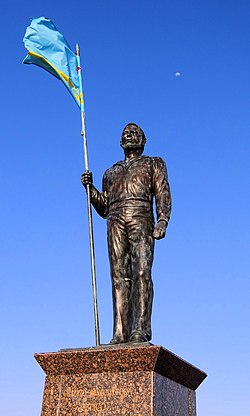Betico Croes
Gilberto François "Betico" Croes (Papiamento pronunciation: [beˈtiko kɾus]; 25 January 1938 – 26 November 1986) was an Aruban political activist who was a proponent for Aruba's separation from the Netherlands Antilles. This eventually occurred in 1986, but following a car accident on 31 December 1985 (the night of status aparte), Croes lapsed into a coma and never became conscious to see his accomplishment. He is best remembered as "Libertador" (liberator) and as father of the Aruban people.[1][2]
Betico Croes | |
|---|---|
 Croes in 1982 | |
| Born | Gilberto François Croes 25 January 1938 |
| Died | 26 November 1986 (aged 48) Aruba |
| Occupation | teacher, politician |
Biography and career

Croes was born on 25 January 1938 in Santa Cruz.[3] After finishing high school, he studied in the Netherlands at the Teachers' Training College in Hilversum, and received his headmasters certificate in 1959.[4]
Croes was the leader of the political party People's Electoral Movement (Movimiento Electoral di Pueblo) and in 1976 was the person responsible for the Seal, Flag and Hymn of the island of Aruba. The hymn was co-written by renowned Padu Del Caribe (Padu Lampe), and Rufo Wever, who also composed the anthem.[2]
He was also responsible for the referendum held in March 1977, regarding Aruba's independence, in which 83% of the votes were in favor of independence.
Betico Croes also was responsible for formally setting Aruba's Independence Date for 1991, at the Round Table Conference in February 1981, But at the Round Table Conference in March 1983 the date for Aruba's Independence was changed from 1991, and set in two stages/steps: the first stage/step: Aruba's Independence from the Netherlands Antilles was set for 1986, and for ten years later, the second stage/step: Aruba's Independence from the Netherlands, for 1996. At Betico's arrival in Aruba, after the RTC, he was received with total approval and joy by the people.
He is also responsible for the fact that in August 1985: Aruba's Constitution and its Independence first from the Netherlands Antilles, and then from the Netherlands, as agreed in March 1983, in Aruba's Decolonization and Independence Agreement, is unanimously approved by all political parties in Aruba.
In the 1980s he recommended that Aruba should target tourism in order to diversify the economy since it depended mainly on the refinery.
Croes was also responsible for major projects for the people of Aruba, like F.C.C.A., the transportation company Arubus, the Sasaki Plan (he envisioned the area destined for hotels) and many more.
On 31 December 1985 Croes was in a traffic accident, and was in a coma until his death on 26 November 1986.[4]
A famous quote from him is "Si mi cai na caminda, gara e bandera y sigui cu e lucha" (If I fall down along the way, grab the flag and continue the battle).[1][2]
Personal life
Croes had four children: two sons—Glenbert Croes and Gilberto Junior Croes and two daughters—Glendeline Croes and Guisette Croes.
Both of Croes' sons served as Ministers and Glenbert is currently in office as Minister of Social Affairs and Labor.[2]
Legacy
- Aruba's official Holiday to remember him has been marked on 25 January, his birth date.
- Caya G. F. Betico Croes is named after him and is the main shopping street of Oranjestad, the Aruban capital.
References
| Wikimedia Commons has media related to Betico Croes. |
- Betico Croes. historiadiaruba.aw
- Gilbert François (Betico) Croes. Biblioteca National Aruba
- "Santa Cruz". Retrieved 11 October 2020.
- "Betico Croes". Historia di Aruba. Retrieved 11 October 2020.